Suchergebnisse
DRoB - Drohnen und Robotik für effizientes Monitoring und Pflegemanagement von Gebäudebegrünungen
Strategische transdisziplinäre Expertenvernetzung zur Analyse innovativer Monitoring und Pflegesysteme für Gebäudebegrünungen. Ziel ist das Aufzeigen der Potenziale unterschiedlicher UAV-Sensoren für das Vegetationsmonitoring sowie von Roboter für die Pflege von Bauwerksbegrünungen.
Sophokles - Sonnenschutzlamellen mit photovoltaischer Beschichtung für klimaneutrale, energieeffiziente Strukturen
Entwicklung von leichtgewichtigen, bandförmigen Photovoltaikmodulen, welche Beschattung und emissionsfreie Stromerzeugung in einem monolithischen Bauteil vereinen. Die Photovoltaiklamellen können in Größe und Modulspannung individuell an die Gegebenheiten des Gebäudes angepasst werden. Kern der Innovation ist ein Verschaltungskonzept für Dünnschichtsolarzellen, mit dem das folienartige Photovoltaikmaterial je nach Bedarf seriell und parallel verschaltet werden kann.
Sophokles - Solar shading lamellas with photovoltaic coating for climate-neutral, energy-efficient structures
Development of lightweight, strip-like photovoltaic modules that combine shading and emission-free power generation in one monolithic component. The size and module voltage of the photovoltaic blinds can be individually adapted to the conditions of the building. The core of the innovation is an interconnection concept for thin-film solar cells, with which the film-like photovoltaic material can be interconnected in series and in parallel as required.
greening UP! Nachhaltige Grünpflege, Wartung, Instandhaltung von vertikalen Begrünungen inkl. rechtliche Aspekte
Im Projekt wurden aufbauend auf umfassenden Erhebungen und Analysen von bestehenden vertikalen Gebäudebegrünungen in Außenräumen (boden- und systemgebundene Fassadenbegrünungen) und vertikalen Innenraumbegrünungen passgenaue Grünpflege-, Wartungs- und Instandhaltungskonzepte erarbeitet und rechtliche Aspekte adressiert. Der "greening UP!"-Wissenspool mit konkreten Empfehlungen und anschaulich aufbereitetem Wissen sowie die Konzeption eines digitalen Tools zur "Ersten Grünen Hilfe" runden das Projekt ab.
GameOpSys - Gamification für die Optimierung des Energieverbrauchs von Gebäuden und übergeordneten Systemen
Zentrales Ziel ist die Entwicklung einer mobilen Anwendung, welche durch Partizipation des Nutzers und der Nutzerin als neue Daten- und Informationsquelle die Energieoptimierung und Planung von Gebäuden, Quartieren und übergeordneten Energiesystemen ermöglicht. Die Entwicklung der Anwendung erfolgt stark transdisziplinär und integriert dabei mathematische Methoden der Simulation und Optimierung sowie psychologische Aspekte des Nutzerverhaltens um neue Geschäftsmodelle zu erarbeiten und neue Märkte zu erschließen.
LooPi BETA VERSION. LooPi - das autarke unisex Pflanzen Urinal für den öffentlichen Raum. Beta Version.
Einsatz des Prototyps in Betriebsumgebung über einen Zeitraum von 20 Monaten. Technisches Monitoring über den Jahreszeitenzyklus, sowie NutzerInnenbefragungen zur Zufriedenheit, und Erhebung des möglichen Einsatzes von LooPi-Materialströmen zur Bodenverbesserung im biologischen Landbau. Ergebnisse dienen der Entwicklung zur Marktreife.
LooPi - the autonomous unisex plant-based urinal for public spaces
Application of the prototype in the operational environment for a period of 20 months. Technical monitoring thoughout the cycle of seasons, user interviews concerning satisfaction, evaluation of the potential use of LooPi material streams as soil conditioner for organic farming. Results serve the development towards market maturity.
VERTICAL FARMING - Investigation on requirements of a Vertical Farm-prototype development for crop plant production
In the center of interest stands the investigation of fundamental principles for a new building typology – the Vertical Farm. Urban vertical food production can contribute to more energy efficient cities by concurrently reducing land use. Substantial influencing factors to achieve these goals are intended to be revealed.
BIMSavesEnergy - BIM-basierte Planungsmethoden zur Sicherstellung von Energie-effizienz im Bauprozess
Das Building Information Model (BIM) bewirkt grundlegende Veränderungen in Planung und Bau von Gebäuden, da durch die gemeinsame Datenbasis erstmals eine enge, organisationsübergreifende Zusammenarbeit in Bauprojekten möglich wird. In diesem Projekt wurden BIM-basierte Planungsmethoden entwickelt, die den Einfluss von Planungsentscheidungen auf die Energieeffizienz quantitativ bewertbar und im Managementprozess steuerbar machen.
VERTICAL FARMING - Ermittlung der Anforderungsbedingungen zur Entwicklung eines Vertical Farm Prototyps zur Kulturpflanzenproduktion
Im Mittelpunkt stand die Erforschung von Grundlagen für eine neue Gebäudetypologie, der Vertikalen Farm. Urbane vertikale Lebensmittelproduktion kann zur Steigerung der Energieeffizienz von und zur Reduktion des Landverbrauchs durch Städte beitragen. Wesentliche Einflussfaktoren zur Erreichung dieser Ziele werden durch diese Grundlagenforschung offen gelegt.
Digitization in the construction and real estate industry
In the multitude of digital possibilities, it is very difficult to maintain an overview, to assess trends and potentials, and to recognize correlations. This report therefore aims to describe the current state of the art and the market assessment of promising digital technologies. Information is provided on concrete use cases, added value and challenges of the respective technologies. The analyses presented serve to assess the potential and set the strategic course for the integration of the currently most important digital technologies in the construction and real estate industry.
Ergebnisband „Urban Data Management“
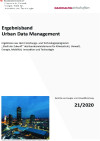
Der vorliegende Ergebnisband stellt abgeschlossene Projekte aus dem Forschungs- und Technologieprogramm „Stadt der Zukunft“ des Bundesministeriums für Klimaschutz, Umwelt, Energie, Mobilität, Innovation und Technologie (BMK) im Bereich Urban Data Management vor. Die gewonnenen Erkenntnisse sollen eine Entwicklung in Richtung energieeffiziente und klimaverträgliche Stadt unterstützen, die auch dazu beiträgt, die Lebensqualität und die wirtschaftliche Standortattraktivität zu erhöhen.
Schriftenreihe
21/2020
Redaktionelle Gestaltung: Bianca Pfefferer, Hannes Warmuth (ÖGUT)
Herausgeber: BMK
Deutsch, 24 Seiten
Downloads zur Publikation
Ergebnisband „Klimaneutrale Städte"
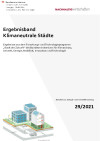
Der vorliegende Ergebnisband stellt abgeschlossene Projekte aus dem Forschungs- und Technologieprogramm „Stadt der Zukunft“ des Bundesministeriums für Klimaschutz, Umwelt, Energie, Mobilität, Innovation und Technologie (BMK) im Bereich Klimaneutrale Städte vor. Die gewonnenen Erkenntnisse sollen eine Entwicklung in Richtung energieeffiziente und klimaverträgliche Stadt unterstützen, die auch dazu beiträgt, die Lebensqualität und die wirtschaftliche Standortattraktivität zu erhöhen.
Schriftenreihe
29/2021
Redaktionelle Gestaltung: Bianca Pfefferer, Hannes Warmuth (ÖGUT)
Herausgeber: BMK
Deutsch, 22 Seiten
Downloads zur Publikation
Ergebnisband „Gebäudetechnologien“
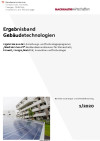
Der vorliegende Ergebnisband stellt abgeschlossene Projekte aus dem Forschungs- und Technologieprogramm „Stadt der Zukunft“ des Bundesministeriums für Klimaschutz, Umwelt, Energie, Mobilität, Innovation und Technologie (BMK) im Bereich innovativer Gebäudetechnologien vor. Die gewonnenen Erkenntnisse sollen eine Entwicklung in Richtung energieeffiziente und klimaverträgliche Stadt unterstützen, die auch dazu beiträgt, die Lebensqualität und die wirtschaftliche Standortattraktivität zu erhöhen.
Schriftenreihe
1/2020
Redaktionelle Gestaltung: Bianca Pfefferer, Hannes Warmuth (ÖGUT)
Herausgeber: BMK, Aktualisierung: Mai 2021
Deutsch, 25 Seiten
Downloads zur Publikation
Technologiereport: Digitalisierung der Bau- und Immobilienbranche
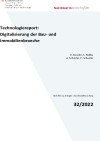
In der Vielzahl digitaler Möglichkeiten ist es nur sehr schwer möglich, einen Überblick zu behalten, Trends und Potentiale abzuschätzen sowie Zusammenhänge zu erkennen. Der vorliegende Report zielt daher darauf ab, den aktuellen Stand der Technik und die Markteinschätzung vielversprechender digitaler Technologien zu beschreiben. Es werden Informationen über konkrete Anwendungsfälle, Mehrwert und Herausforderungen der jeweiligen Technologien bereitgestellt. Die dargestellten Analysen dienen der Potentialbewertung und der strategischen Weichenstellung zur Integration der aktuell wichtigsten digitalen Technologien der Bau- und Immobilienbranche.
Schriftenreihe
32/2022
K. Künzler, S. Robbi, A. Schuster, P. Schuster
Herausgeber: BMK
Deutsch, 92 Seiten
Downloads zur Publikation
LINE-FEED - Plug-in Photovoltaik-Speicher für die Steckdose
Im Projekt LINE-FEED wurden Technologien entwickelt, die für einen Photovoltaik-Speicher benötigt werden, der von jedem Laien an einer gewöhnlichen Steckdose angeschlossen werden kann. Ziel war die Entwicklung eines Speichersystems für Haushalte in urbanen Räumen, welche selbst keine Möglichkeit der Installation einer Photovoltaikanlage haben.
LINE-FEED - Plug-in Photovoltaic Storage for the Wall Socket
The project LINE-FEED developed technologies that are required for a photovoltaic storage system which can be installed by anybody by simply plugging it into a wall socket. The aim was to create a storage system for households in urban areas that do not have the possibility to install a photovoltaic system themselves.
Ergebnisband „Urbane Wärme und Kälte“
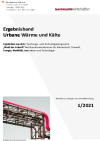
Der vorliegende Ergebnisband stellt abgeschlossene Projekte aus dem Forschungs- und Technologieprogramm „Stadt der Zukunft“ des Bundesministeriums für Klimaschutz, Umwelt, Energie, Mobilität, Innovation und Technologie (BMK) im Bereich Urbane Wärme und Kälte vor. Die gewonnenen Erkenntnisse sollen eine Entwicklung in Richtung energieeffiziente und klimaverträgliche Stadt unterstützen, die auch dazu beiträgt, die Lebensqualität und die wirtschaftliche Standortattraktivität zu erhöhen.
Schriftenreihe
1/2021
Redaktionelle Gestaltung: Bianca Pfefferer, Hannes Warmuth (ÖGUT)
Herausgeber: BMK
Deutsch, 24 Seiten
Downloads zur Publikation
3D*3B - 3D-Betondruck und Bewehrung für emissionsarme biegebeanspruchte Tragstrukturen des Hochbaus
Interdisziplinäres Projekt zur Integration von 3D-Betondruckelementen in vorwiegend biegebeanspruchte Tragstrukturen mit dem Ziel der nachweisbaren Reduktion von klimarelevanten Emissionen im Baubereich. Die Ergebnisse dienen der umfassenden Beurteilung technischer, logistischer und klimarelevanter Aspekte.
see-it - Camera based, user centric daylight control system for optimized working conditions
In the project technologies in the field of building construction and building automation are being researched for quality and performance improvements in the workplace. The aim is to individualize the control of sun protection to the people who need to be protected from glare and overheating and hope to see through.
